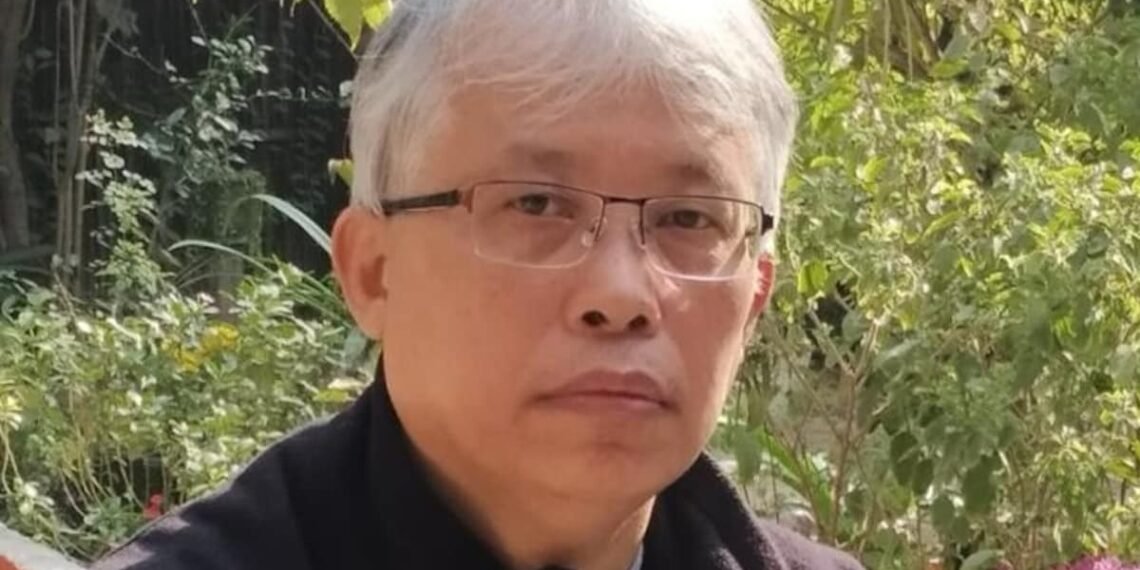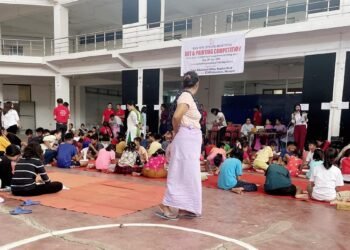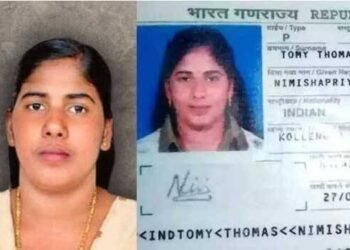BY PC Bureau
April 20, 2025 – Congress MP from Inner Manipur, Angomcha Bimol Akoijam, unleashed a blistering critique of the central government’s imposition of President’s Rule in Manipur, linking it directly to the Meitei community’s growing frustration over their inability to undertake the annual pilgrimage to the sacred Thangjing and Koubrou Hills
. Speaking to media in Imphal on Sunday, Akoijam, a vocal advocate for the Meitei community, decried the Centre’s failure to ensure free movement across the state—a promise made by Union Home Minister Amit Shah on March 8, 2025—as a “flop show.” He attributed the blockade of the pilgrimage, a cornerstone of Meitei cultural and religious identity, to ongoing opposition from the Kuki-Zo community, escalating ethnic tensions in a state ravaged by violence since May 3, 2023.
Meitei Pilgrimage Thwarted by Kuki-Zo Protests
The conflict, pitting the Meitei majority against the Kuki-Zo tribes was triggered by a Kuki-Zo protest against the Meitei demand for Scheduled Tribe (ST) status, leading to over 260 deaths, 60,000 displacements, and the creation of fortified buffer zones separating Meitei-dominated Imphal Valley from Kuki-Zo-controlled hill districts. Since April 2025, Kuki-Zo civil society groups, including the Kuki Students’ Organisation (KSO) and Kuki Inpi Churachandpur (KIC), have actively blocked Meitei access to these hills, citing territorial claims and the absence of a political resolution to the conflict.
On April 10, 2025, the KSO and KIC issued a statement warning Meiteis against crossing the buffer zone for the Thangjing pilgrimage, declaring, “Any attempt to enter Kuki-Zo land without a constitutional settlement is a provocation.” This was followed by a large-scale sit-in on April 13 at Thangjing Hill’s foothills, where over 500 Kuki-Zo protesters, including women and children from villages like Pholjang and Gothol, blocked access routes with banners reading, “Protect Our Land, Respect Our Rights.” A similar demonstration in Kangpokpi saw Kuki-Zo groups vowing to prevent Meitei pilgrims from reaching Koubrou Hill, alleging historical Meitei encroachment on tribal lands.
Akoijam’s Outburst:
Akoijam’s Sunday outburst directly tied the Meitei community’s pilgrimage woes to the Centre’s failure to deliver on its March 8 promise of free movement. “The Union Home Minister’s assurances were hollow,” he told reporters, highlighting how Meiteis remain unable to access Thangjing and Koubrou Hills due to “threats from the Kuki-Zo community.” He accused the Centre of lacking the political will to resolve the crisis, arguing that President’s Rule, imposed on March 13, 2025, after Chief Minister N. Biren Singh’s resignation, has only centralized control without addressing the ethnic divide.
Elected in 2024 by a largely Meitei electorate, Akoijam has emerged as a fierce advocate for his community, reflecting their deep frustration over restricted access to cultural and religious sites. In a July 2024 Lok Sabha speech, he described Manipur’s crisis as a “civil war-like situation,” emphasizing the Meitei sense of marginalization. His Sunday remarks echoed this sentiment, framing the pilgrimage blockade as a violation of constitutional rights. “The Meitei people are being denied their sacred traditions while the Centre watches in silence,” he said, urging the government to use President’s Rule to facilitate safe passage and resettle displaced persons, many of whom are Meiteis living in relief camps.
ALSO READ: Calls Grow to Halt Cremation, Justice for Tibetan Monk
Akoijam’s focus on the pilgrimage reflects broader Meitei grievances, including the loss of access to ancestral lands and the displacement of over 30,000 Meiteis from mixed areas like Churachandpur and Moreh. The blockade of Thangjing and Koubrou Hills, seen as symbols of Meitei heritage, has become a rallying point, with community groups like COCOMI accusing Kuki-Zo leaders of “weaponizing territorial control to erase Meitei culture.” Posts trending on X show Meitei youth sharing images of past pilgrimages, captioned with hashtags like #SaveThangjing and #MeiteiRights, amplifying the issue.
Kuki-Zo Perspective and Escalating Tensions
The Kuki-Zo community, however, views Meitei attempts to access the hills as an encroachment on their ancestral lands, a grievance rooted in historical land disputes and the 2023 violence. The Indigenous Tribal Leaders Forum (ITLF) argues that the hills are integral to Kuki-Zo identity, with Thangjing historically hosting tribal festivals.
The Kuki-Zo blockade has been accompanied by increased militarization, with tribal volunteers patrolling access routes and reports of arms stockpiling in hill districts. On April 16, a skirmish near Thangjing Hill injured three Meitei youths attempting to scout pilgrimage routes, further inflaming tensions. The incident prompted Akoijam to warn that “such provocations risk spiraling into broader violence,” calling for urgent central intervention.
President’s Rule and Governance Failures
Akoijam’s critique of President’s Rule, which he described as a “tool to suppress rather than solve,” underscores his belief that the Centre has failed to address the root causes of Manipur’s crisis—competing ethnic demands, illegal immigration, and the controversial Suspension of Operations (SoO) agreement with Kuki insurgent groups. He argued that the Centre’s heavy-handed approach, including deploying over 50,000 central forces, has not restored normalcy, as evidenced by the pilgrimage blockade. “Peace requires resettling displaced persons and ensuring free movement, not just military control,” he said, echoing Meitei demands for rehabilitation of IDPs living in “wretched” relief camps.
ALSO READ: Assam Horror: Man Beheads Wife, Rides to Police Carrying it
The Congress MP’s remarks also reflect his broader critique of the Centre’s erosion of Manipur’s federal autonomy, a theme he explored in a February 2025 Indian Express article. He accused the BJP-led government of using President’s Rule to deflect blame for its mishandling of the crisis, pointing to earlier encroachments like appointing key state officials under Article 355. For Meiteis, who see Akoijam as their voice, his outburst channels their anger at being “trapped in their own state,” as one Imphal resident posted on X.
The pilgrimage dispute has reignited debates about coexistence in Manipur, with Akoijam urging the Centre to demonstrate “political wisdom” to bridge ethnic divides. He has renewed calls for a Joint Parliamentary Committee (JPC) to investigate the conflict’s origins, a demand rejected by BJP leaders like M. Suresh, who argue that central control absolves the state of responsibility. Meanwhile, Kuki-Zo groups demand a separate administration, a proposal Meiteis oppose, further complicating peace talks.
The humanitarian toll remains stark, with 60,000 IDPs awaiting rehabilitation. Akoijam’s focus on their plight, coupled with the pilgrimage issue, underscores the Meitei community’s sense of cultural and physical displacement. “We cannot normalize this crisis,” he told reporters, warning that ignoring Meitei grievances risks further unrest.
ALSO READ: Netizens Roast Biren Singh Over Manipur Hill Road Blame Game













